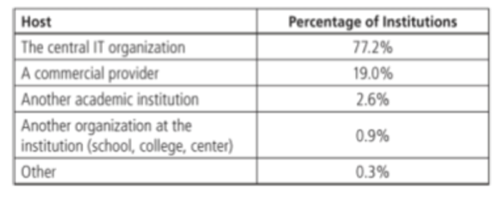In the earliest days of the Internet, getting an .edu email address and signing in to Pine for the first time was a rite of passage for many college freshmen. Now, however, virtually every new college student got an email address before even graduating from primary school. Because of this, a number of schools are now considering phasing out email hosting for their students altogether. According to a recent report (PDF), 20% of American colleges already outsource their email systems to commercial providers, and more plan to do so in the future.

First Step: Outsourcing
Interestingly, while student email is often outsourced, faculty and staff email is generally
hosted in-house because of concerns over confidentiality. Only 2.3% of all schools outsource these systems to commercial vendors.
Schools, for the most part, aren’t able to keep up with the speed of innovation on the web anyway, and the fact that many college-run email systems have fallen far behind the innovation curve has driven a lot of students to just forward their school email to a commercial account anyway.

Given the cost pressures that schools are under right now, the choice for these colleges is to either spend a lot of money on providing costly email systems that most students hardly ever look at, or to outsource them to a commercial vendor, or even to Google, which will happily offer these services for free.
Next Step: Get Rid of It
The logical next step, then, is to simply stop providing .edu email addresses to students – and a number of schools are actually considering this move. Last month, at The Chronicle of Higher Education’s Technology Forum, Steven Zink of the University of Nevada in Reno announced that his campus plans to stop providing students with a college email system altogether.
Most colleges will probably continue to provide students with an official .edu email address, but this will just be used for forwarding mail to another account – something most students prefer over using their college email systems anyway.
In many ways, this makes a lot of sense. Schools won’t give up email as their preferred way of communicating with students anytime soon, but the days when colleges provided the most important on-ramp to email and the Internet for their students are long over.





















